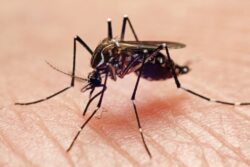Research on mosquito bites may no longer require living subjects (Picture: Getty Images)
Human volunteers – or animal test subjects – may not be needed in future to research mosquito bites.
Because of the huge amount of diseases they spread, mosquitos are the world’s deadliest creatures. As a result, understanding their feeding criteria is a top goal for scientists looking to minimise the amount of damage they can inflict.
Now, researchers from Rice University and Tulane University in the United States have developed a new kind of biomaterial that could act as a stand-in for live flesh.
‘Several groups are dedicated to finding ways to stop mosquitoes from biting, but bringing new repellents to market is challenging,’ said Prof Omid Veiseh from Rice University.
‘This study attempts to increase testing throughput and decrease dependence on human volunteers and animal subjects,’ Prof Veiseh, a corresponding author of the research published in Frontiers in Bioengineering and Biotechnology, added.
The team developed a new platform that combines 3D-printed hydrogels that mimic human skin with a video monitoring and artificial intelligence system.
The mosquitos were filmed while they snacked on the hydrogels permeated with blood. The resulting videos were analysed by a machine learning algorithm that differentiated between mosquitoes that had fed from the hydrogels and mosquitoes that had not.
Illustration showing the mosquitoes feeding on the hydrogels (Picture: Janson et al)
This made it easier to analyze data on large numbers of feeding mosquitoes quickly and effectively, with an average precision of 92.5 per cent.
According to the study, the hydrogels can be perfused with different types of blood and other liquids, which makes it possible to study different species of mosquito that feed on different kinds of prey.
It also made it possible for the scientists to validate the model by perfusing it with different fluids to show that the mosquitoes were attracted to the blood.
‘All of the experiments used lab strains of mosquitoes, and the majority involved one particular species: Aedes aegypti, the vector of the yellow fever virus, dengue virus, Zika virus, and others,’ said Prof Dawn Wesson, from Tulane University, a co-corresponding author.
‘It may take time to optimise our experimental platform and machine learning model to study other species. Also, since the behavior of laboratory strains sometimes differs from that of mosquitoes found in the wild, it would be important to validate our results on wild mosquito populations.’
Mosquitoes can carry diseases like denge fever and yellow fever (Picture: Getty)
Professor Veiseh added: ‘Overall, our results suggest that our experimental platform could be scaled up and adapted to screen different compounds for their effects on mosquitoes.
Dr. Kevin Janson, the first author of the study, added: ‘The machine learning model we developed can automate experimental analysis and provide results far more quickly and consistently than a human could.
‘We hope that this platform could rapidly identify promising candidates for more effective repellents to decrease the spread of disease in the future.’
MORE : Mosquitoes bite some people more than others based on their smell
MORE : Why do some people get bitten so badly by mosquitoes while others get away bite-free?
Mosquitoes are the world’s deadliest creatures.





